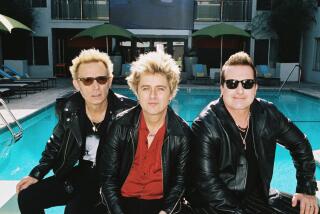Relatively Speaking : Peter Himmelman Writes Music About Things Close to Him--Including Family Members
Write a few verses and a chorus, tack on a melody and a musical arrangement and--presto--you’ve got a pop song.
But Peter Himmelman thinks there needs to be one other ingredient: a reason for writing it.
“I tell a lot of my friends who have trouble writing or completing a song that it’s very important to come up with a motivation, and not just ‘I want to be a star’ or ‘I want a record deal,’ ” says Himmelman, a tall, slender, 32-year-old rocker from Minnesota who has come up with sufficient motivation to write five serious-minded, frequently excellent albums informed by pop-rock, folk-rock and R&B; influences.
For “Flown This Acid World,” his newest and best album, Himmelman--who plays tonight at the Coach House in San Juan Capistrano--found his reasons in some of the people closest to him.
“Child Into a Man” is a love song to a parent. “It’s for my mom,” Himmelman said on the phone from a tour stop in Scottsdale, Ariz. “I started with the line, ‘You said I never wrote a song for you.’ I’d written a song for my dad (“This Father’s Day,” the touching title track from Himmelman’s 1986 debut album), and I just wanted to write one for her.”
Several songs on the album are for Himmelman’s wife (he married Bob Dylan’s daughter, Maria, in 1988). Some reflect the rocky moments that have to be negotiated in a relationship, but they lead up to a glowing, affirmative love song, “Cross This Bridge.”
Having written a song for his son on his 1991 album “From Strength to Strength,” Himmelman now offers “Raina,” a hopeful lullaby for his infant daughter.
“When my daughter was born, it was one of those moments when the world of television and Madonna and Heinz ketchup wilts away. There’s been a lightning bolt, a miracle, and you can see that God really exists in the world. It’s a gift, and then it closes up. You’re (back to everyday life), wondering how you’re going to make it to your agent’s by 4:30. When I sing it onstage, it’s possible that I can get back to that (miraculous) place. That’s the motivation for that one.”
Until now, hardly any rock musicians have been motivated to write songs that deal meaningfully with the Holocaust (Captain Beefheart’s “Dachau Blues” is a good one; the speed-metal band Slayer recorded a perhaps well-intentioned but crudely sensationalized song, “Angel of Death,” about the barbaric concentration camp doctor, Josef Mengele). Himmelman ends “Flown This Acid World” with “Untitled,” an eight-minute epic about the roots and consequences of bigotry.
The story starts in a Minnesota taxi and ends with a repudiation of those who killed 6 million Jews, and those who to this day would either applaud their crime or deny that it ever happened.
“It’s a true story of my being Jewish, and the victimization of the Jewish people,” Himmelman said. “But there’s a certain universality to the thing--it brings up the question, ‘How is it people can exist with such blind hatred for other people?’ Live, it can just cut through the audience.”
Much of the song recounts a harrowing taxi ride with a driver who, apparently unaware that Himmelman was Jewish, spouted a neo-Nazi, white-supremacist line.
“My uncle (later) said, ‘Why didn’t you take out a tire iron? Why didn’t you confront him?’ But I have a really strong curiosity. I’m a pretty good actor, and I sunk into the role of a journalist. I played a really stupid guy,’ asking deliberately ingenuous questions to draw the driver out. “I wanted to really find out what happens” in the mind of a hater.
“He said he takes a class, like you might take a class in ceramics or Civil War history--it discusses the Jews. Some of the things he said were so outlandish, it reminded me of (Joseph) Goebbels (the Third Reich’s propaganda minister), who said that if you put (forward) a lie enough, people will believe it. He said that in order to be a man, it’s a Jewish principal that everybody has to rape a baby. My skin started to crawl.”
Himmelman said it wasn’t until three years after the cab ride that he found his reason for turning the experience into a song.
“In the morning, I pray with a group of people. A lot of them are old guys from Poland and Romania, and a lot of them have numbers on their arms (the mark of a death camp survivor). One of them is such a sweet guy, he lost his wife, his kids, everything, and he just doesn’t have any bitterness. I met him and wrote this song. I wrote it in a flash.”
Himmelman ended “Untitled” with these lines about the man who inspired the song, and his own mission in writing it:
I spent the next morning with a man who had death camp numbers on his arm,
And I swore to myself I would do anything to protect him from further harm.
He told me, “Wherever you go, you must refute them if they say it isn’t so.”
There are legions of pop stars from Jewish backgrounds (Dylan, Simon & Garfunkel, David Lee Roth, Carole King, Phil Spector, the Beastie Boys, Barry Manilow, Neil Diamond and Barbra Streisand leap to mind) but as far as Himmelman knows, he is the only one who observes some of the faith’s strictest traditions, including eating only kosher foods, and refusing to perform on the Sabbath or Jewish holidays.
“I haven’t heard of any (others), but that doesn’t make me feel alone,” said Himmelman, who turned toward traditional observance and intense religious studies six or seven years ago, after a less strict upbringing. “Everyone’s on (his) own path.”
For Himmelman, observing the Sabbath means no performing on Friday nights--prime time in the world of rock nightclubs and concert tours. “Once we were going to do the ‘Tonight Show’ with Johnny Carson and I had to turn it down because there were a couple of holidays” that conflicted, Himmelman said (he is scheduled to play the “Tonight Show” with Jay Leno on Thanksgiving night).
“It gives me a good deal of strength and pride to know there’s an ideology that’s more important to me than the pursuit of fame. But to make a division and say, ‘I’m a religious person’--the whole term doesn’t make any sense to me. For me, trying to maintain a cognizance of God’s existence in the world isn’t religion. It’s just real, it’s just normal.
“The fact I observe Jewish laws has caused some interest. (Some fans) come backstage, they offer me support. But I’m not carrying anybody’s torch. I just do what I do.”
Being Dylan’s son-in-law also is a point of interest--one that Himmelman doesn’t care to emphasize.
“If anything, it’s more of a hindrance, where people who haven’t heard anything I’ve done (can) sort of dismiss it. For people who see the show and hear my stuff, it’s a non-issue. Obviously, he’s a very influential force in my music,” going back long before Himmelman had any inkling that he and Dylan would one day be family. “When they just say, ‘By the way, he’s Bob Dylan’s son-in-law, which is usually how the reviews go, that’s nice.”
Like a lot of kids who jump into rock bands, Himmelman started with dreams of stardom and fortune.
“My dad was an entrepreneur and one of his businesses was an eight-track tape store, the first one in the Midwest. He brought me a Jimi Hendrix record when I was in the sixth grade. He bought me an electric guitar and amp; I spent a hell of a lot of time in front of the bathroom mirror with that thing, combing my hair one way, then the other.
“I stopped fixing my hair six or seven years ago”--the time when he reordered his priorities and began putting more serious expressive concerns ahead of the quest for stardom. By that time, Himmelman and a band of players who had been with him, in some cases, since he was 11 or 12 years old, had released two independent albums as the Sussman Lawrence band. With “This Father’s Day” in 1986, Himmelman began recording under his own name, keeping the same backup band.
The album was released independently but after a cheaply produced video of the song “Eleventh Confession” was picked up by MTV, Himmelman found himself signed to a major label, Island.
He released two more albums on Island, “Gematria” (a term from Jewish mysticism) and “Synesthesia” (an equally arcane term that means confusion of the senses), his sound growing more polished with a technological sheen. In 1988, Himmelman and his band became the first American rockers to tour extensively in the Soviet hinterland, playing a 31-show tour that took them to Armenia and several Asian republics.
Since switching to Epic Records two years ago, Himmelman has simplified his sound (not to mention his album titles) with the acoustic-based “From Strength to Strength” (an allusion to a Hebrew blessing) and the straightforwardly rocking “Flown This Acid World,” a title reflecting the spiritual yearnings that turn up frequently in his songs.
Now based in Santa Monica, Himmelman still has three core members from the old Sussman Lawrence lineup in his band--drummer Andy Kamman, bassist Al Wolovitch and Himmelman’s cousin Jeff Victor on keyboards. New additions are two other Minnesotans, guitarist Greg Herzenach and backup singer Kristin Mooney.
Himmelman says the band’s long partnership is paying off these days in shows that emphasize improvisation.
“We don’t have any set lists. I just feel out the crowd and call out a song for the mood.” He says he likes to tinker with song arrangements, too, sometimes introducing strange or humorous musical approaches that help offset the overwhelmingly serious and fervent tone of most of his songwriting.
“The songs talk about large themes, so for me it’s a perfect foil to enter into a paradoxical element of irony” on stage. “It creates something completely different. There’s a certain sense of self-deprecation that has to take place.”
He lists Minneapolis, Chicago, Washington and the Boulder-Denver area as markets where hometown connections, a steady touring presence or solid radio airplay enable him to play large theaters. Otherwise, he’s just another pop-rock song craftsman with ‘60s antecedents plying the club circuit, trying to find an audience in an era when the big commercial gains more often are reaped by louder, angrier bands that emphasize a high-impact sound and a raw statement of emotion over a gracefully constructed melody and a well-developed lyric.
The music business today “is definitely not focused on singer-songwriters. That’s not the flavor of the week now,” Himmelman said. “The main thing is to do what you do, and keep your head above water. We’re developing a cult following and we can build from that. It’s a good time. I feel my career’s got some new wings on it.”
Peter Himmelman and Shona Laing play tonight at the Coach House, 33157 Camino Capistrano, San Juan Capistrano. Show time: 8 p.m. $12.50. (714) 496-8930.
More to Read
The biggest entertainment stories
Get our big stories about Hollywood, film, television, music, arts, culture and more right in your inbox as soon as they publish.
You may occasionally receive promotional content from the Los Angeles Times.










